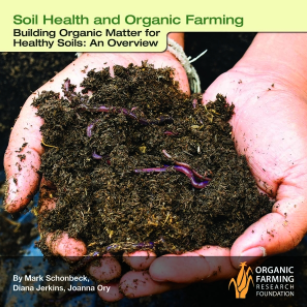OPN recently connected with Brise Tencer, the Executive Director at the Organic Farming Research Foundation (OFRF) to learn more about the state of organic research and why policy is so important. 
OPN Connect: For those not familiar with OFRF give us a little history and background on the organization and its mission.
We were founded in 1990 not coincidently the same year that the Organic Foods Production Act (OFPA) passed in the 1990 Farm Bill. With the passage of OFPA it became clear that what had been an informal process of farmers certifying each other would no longer work. Organic became more regulated and built a level playing field with third party certification.
We have 26 years of funding on-farm research projects on organic production practices. The goal of our program was originally founded and remains to this day the improvement and widespread adoption of organic farming systems, that’s the underlying goal of all our activities.
OPN Connect: What kind of research project do you fund? How do you decide which projects will make the most impact in organic farming?
The breadth of projects is diverse in both topic and region; we are focused in North America and most heavily in the US.
We have a strong history of open calls for proposals. We welcome researchers, farmers and others coming to us to make the case about how a project will be of value to producers.
We have our own criteria for vetting the process. Throughout our history we have conducted national farmer surveys to better understand their needs and challenges. That’s critical to our ability to review research proposals to see how they are addressing the needs as told by organic farmers.
The projects must be dedicated to supporting production practices and the results are shareable and publically held.
OPN Connect: Do you have any real-life examples where your small grants seeded a much larger initiative?
Our grants are relatively small, between $15-20K. We have a great track record of seeding work in the first few years that has gone on to enable researchers to successfully apply and leverage significant additional federal grant dollars.
One example is a project led by UCSC on how to produce strawberries without fumigants such as methyl bromide. We funded a relatively small grant to get that work started.
The work was so successful that the research team went on to get a USDA SARE grant for $200,000 to continue the work. From there they received $2 million dollars from a USDA OREI grant, and have added new components with millions of federal dollars coming in.
We were the first ones to make that investment to get their work underway. They wouldn’t have been able to get that additional funding if we hadn’t made that initial investment.
OPN Connect: How does your work turn into practical ways to help farmers develop and improve integrated organic management practices?
The findings of many of our projects are being utilized by a wide array of growers. We have published guides that are summaries of the research beyond just what we have funded. So growers can look at a synthesis of information on various topics.
We have a series of seven educational guides on the latest research results on soil health practices. These are in high demand. All of the guides are available to download from our website free of charge.
OPN Connect: Why is OFRF involved in federal policy? Why is it important for the funding community to care about this area?
Because we conduct national farmer surveys and have robust data on certified organic farmers, we are beholden to share those needs with policy makers and make sure that public policies are working for organic farmers.
We recently worked with members of Congress on both sides of the aisle to introduce the Organic Agriculture Research Act, a bill that would increase funding for that program to $50M per year. This is baseline funding so when they calculate future Farm Bills it’s a presumed program that gets funded. Under $50M the program isn’t guaranteed.
OPN Connect: How can farmers apply for a research grant?
We have a call for proposals every year. You can be a farmer, researcher, and extension agent – we offer broad eligibility.
There is basic information on our website on how to do on-farm research. We encourage farmers who have a project in mind to reach out and talk with a researcher to get input on project designs.
Keep an eye on our website for the next deadline. This year we will invite letters of intent and we will have more details on timing within the next month. Decisions for the projects we will be funding in 2018 will be made this spring.







